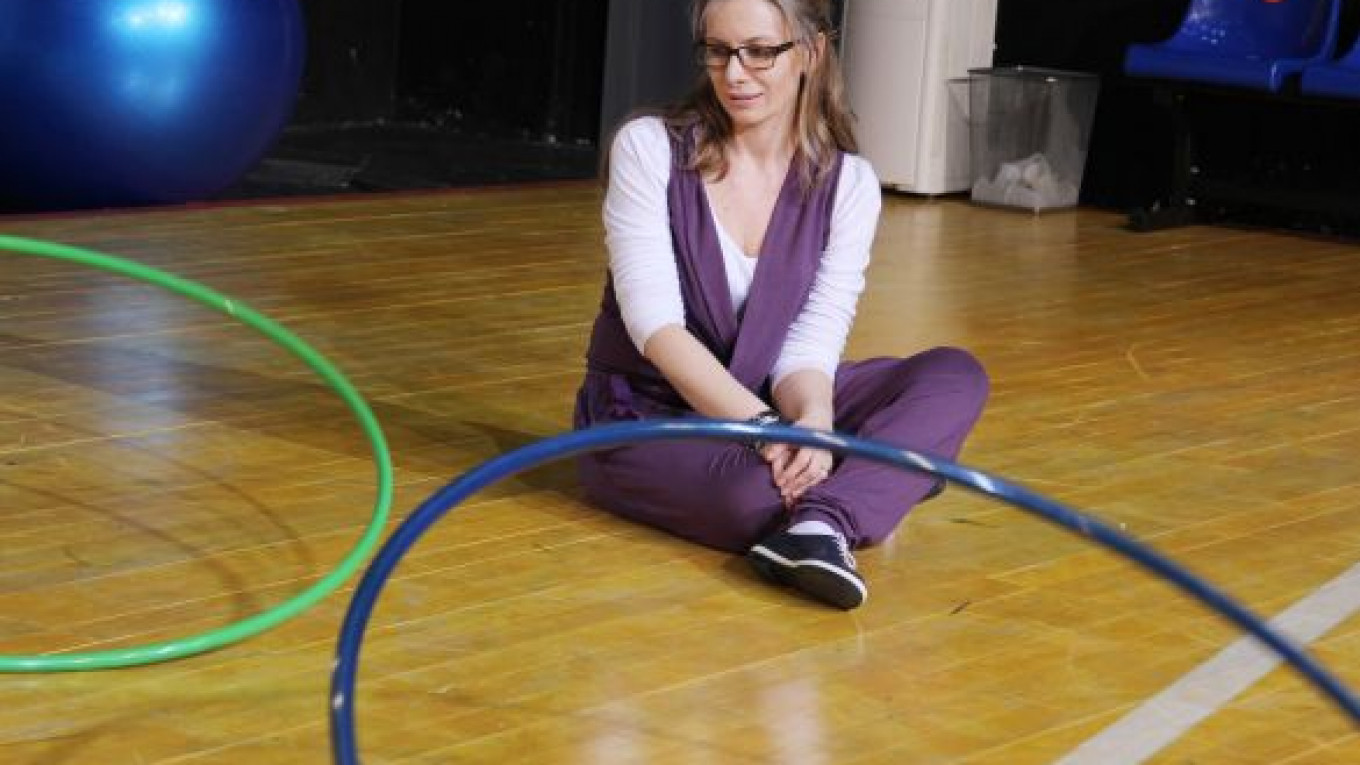Annie Baker, an American playwright who hails from New England, is continuing to forge a professional relationship with Russia.
Her play "The Aliens" has already been produced in three Russian cities, including Moscow's Pushkin Theater. Now, her play "Circle Mirror Transformation" has opened on the small stage of the Moscow Art Theater under the title "Let's Begin Again."
Baker is a subtle, even delicate, writer. Which is not to say that her plays are in any way dainty. In "The Aliens," one character dies from ignorance and weakness, while in "Circle Mirror," people's lives crumble like cookies.
The delicacy of the plays lies in Baker's manner of observing life catastrophes. Like a surgeon, she is fascinated by the pathologies she encounters and is exact in her attempts to understand them. However, like a loving sister, she knows that failure, fallibility and clumsiness are integral parts of the human experience, and not elements that contradict or defile it.
"Circle Mirror Transformation" presents five participants collected together in the profoundly American experience of a community self-help class. It is run by Marty (Darya Yurskaya), who participates in all activities with her husband James (Igor Zolotovitsky), a struggling actress Theresa (Olga Voronina), the wood sculptor Schultz (Valery Troshin), and a teenage wannabe actress named Lauren (Anastasia Velikorodnaya).
Director Adrian Giurgea, a Romanian-born American, gives the play a lovely, colorful and heartfelt reading. Not to mention funny: It's very, very funny — often at the most awkward or saddest of moments.
Giurgea and his designer Nikolai Simonov throw us a curve at the beginning (to mix sports metaphors). As we enter the hall, a group of five young men in a community sports center are playing a real live basketball game, with all the requisite slam dunks, alley-oops, behind-the-back passes, blocked shots and fast breaks. This is enough to get the audience going to the point where they are applauding baskets made, and groaning at missed shots.
But a bell rings, the men hustle off the court and, one by one, the members of the self-help group enter the space. It's an ingenious bit of pace shifting that enhances the introspective nature of the play to come.
Each individual in the group has his or her reasons for being here. Theresa and Schultz are trying to get over failed relationships. Lauren needs to work out the frustrations of watching her parents' problems up too close. James is pretty much there for Marty, who is there to lead the class — although they will learn that they have a crisis brewing, too.
To her distinct credit, Baker makes it almost impossible to describe her play's plot or story in brief. She frequently cuts events out before they happen, leaving scenes hanging unresolved and unexplained. Dialogue is often made up of small talk and innuendo. Most anything that could be called a traditional event takes place off stage.
Instead, we watch characters attempting to describe the others in the group; acting out imagined scenes involving people who are close to them; and lying on the floor playing a game by which everyone tries to complete a group count to ten, each taking on one number at a time without two people ever speaking at the same time.
What may strike us as a simple — even silly — game at first, grows into a meaningful metaphor for people finding a way to exist in a group, and to sense the impulses of others. The cool thing about Baker's use of the game is that she entirely avoids the kind of psychobabble being used in this article, and turns it into a funny bit of theatrical action.
Under Giurgea's direction all of the actors turn in warm, affecting performances.
Voronina's Theresa, for all her extrovert behavior, remains the biggest enigma of them all, while Yurskaya's Marty has a way of wearing her heart on her sleeve despite attempting to remain safely packed behind several layers of emotional and psychological protective shields.
Troshin's Schultz arguably makes the biggest and longest journey of all the characters, beginning as something of a self-defensive nerd but emerging as an expansive, generous individual.
"Circle Mirror Transformation" is built to be evasive, providing few answers and defining no one clearly. That is its strength and its triumph. This mosaic-like play, and Giurgea's production of it, uses half shades, partial phrases and unfinished scenes to evoke in spectators a full-blooded, emotional response.
"Circle Mirror Transformation" (Russian title: Nachnyom Vsyo Snachala) plays May 13 at 7 p.m. on the Small Stage of the Moscow Art Theater, located at 3 Kamergersky Pereulok. Metro Okhotny Ryad. Tel. 495-629-5370. . Running time: 2 hours, 45 minutes.
Contact the author at [email protected]
Related articles:
A Message from The Moscow Times:
Dear readers,
We are facing unprecedented challenges. Russia's Prosecutor General's Office has designated The Moscow Times as an "undesirable" organization, criminalizing our work and putting our staff at risk of prosecution. This follows our earlier unjust labeling as a "foreign agent."
These actions are direct attempts to silence independent journalism in Russia. The authorities claim our work "discredits the decisions of the Russian leadership." We see things differently: we strive to provide accurate, unbiased reporting on Russia.
We, the journalists of The Moscow Times, refuse to be silenced. But to continue our work, we need your help.
Your support, no matter how small, makes a world of difference. If you can, please support us monthly starting from just $2. It's quick to set up, and every contribution makes a significant impact.
By supporting The Moscow Times, you're defending open, independent journalism in the face of repression. Thank you for standing with us.
Remind me later.







